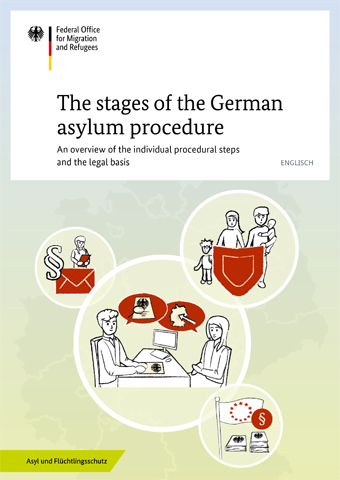The implementation of the asylum procedure ,
This content is also available in
The Federal Office for Migration and Refugees (BAMF) decides on asylum applications on the basis of the Asylum Act (Asylgesetz) and of the Residence Act (Aufenthaltsgesetz), as well as of European directives and regulations. The preconditions for granting international protection (refugee protection and subsidiary protection), the existence of political persecution as defined in the Basic Law (Grundgesetz), as well as bans on deportation, are examined within the asylum procedure.
The task of implementing, fair, efficient asylum procedures is incumbent on the Federal Office’s decision-makers. The examination of and the decision on each asylum application depend on the fate that each individual applicant has suffered.
In order to carry out this demanding task, decision-makers must have comprehensive, up-to-date knowledge of the law on asylum and residence, as well as about the country of origin. Decision-making aids that are used to evaluate the situation in the countries of origin, as well as official instructions, guarantee that the decision-making practice is uniform across the country.
Considerable experience-based knowledge, mastery of interview techniques and a considerable amount of empathy are indispensable in an intercultural context. There are regular mandatory specialist training courses according to the European Curriculum of the European Asylum Support Office (EASO). Specific training and coaching seminars aim to impart theory and practice in dealing with conflicts and crisis situations in interviews, as does individual stress management.
The Federal Office deploys "specially-commissioned case-officers" to examine the asylum applications of particularly vulnerable individuals. They receive additional training, and have special knowledge of how to deal with this group of individuals.
The stages of the German asylum procedure (brochure)
The examination of asylum applications is one of the most important tasks performed by the Federal Office for Migration and Refugees. This brochure will provide you with information on individual aspects of the asylum procedure.

There are specially-commissioned case-officers for persons persecuted because of their gender, unaccompanied minors, victims of torture and victims of trauma, as well as victims of trafficking in human beings.
The Quality Assurance division continually identifies best practices via quality audits and roundtable discussions with experts in Germany and abroad, and identifies where improvements can be made, then incorporating them into decision-makers’ further training.
In order to ensure a flow of information, the Federal Office is in regular contact with recognised organisations in asylum and refugee protection such as the United Nations High Commissioner for Refugees (UNHCR) and the International Organisation for Migration (IOM).
The Federal Office is obliged to examine whether security-related aspects rule out granting protection in individual cases or whether a vulnerability that had previously been identified continues to apply.
The immigration authorities are to involve the Federal Office when it comes to taking decisions on the existence of bans on deportation related to the destination country outside of the asylum procedure. Persons seeking protection have a right to an asylum procedure. However, they may not freely choose the country in which the procedure is carried out. It is ascertained in the Dublin procedure which European country is responsible for examining an asylum application. This is to ensure that each asylum application that is lodged in the EU, Norway, Iceland, Switzerland and Liechtenstein is only examined by one country.

